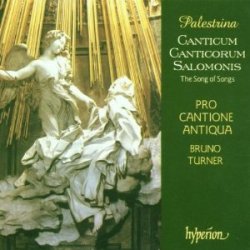Palestrina – Canticum Canticorum (1994)
Palestrina – Canticum Canticorum (1994)

1. Osculetur me osculo oris sui 2. Trahe me post te 3. Nigra sum sed formosa 4. Vineam meam non custodivi 5. Si ignoras te, o pulchra 6. Pulchrae sunt genae tuae 7. Fasciculus myrrhae dilectus meus 8. Ecce tu pulcher es 9. Tota pulchra es, amica mea play 10. Vulnerasti cor meum 11. Sicuit lilium inter spinas 12. Introduxit me rex in cellam 13. Laeva eius sub capite meo 14. Vox dilecti mei 15. Surge, propera, amica mea 16. Surge amica mea, speciosa mea 17. Dilectus meus mihi 18. Surgam et circuibo civitatem 19. Adiuro vos, filiae Hierusalem 20. Caput eius aurum optimum 21. Dilectus meus descendit play 22. Pulchra es amica mea 23. Quae est ista quae progreditur 24. Descendi in hortum meum 25. Quam pulchri sunt gressus tui 26. Duo ubera tua 27. Quam pulchra es, et quam decora 28. Guttur tuum sicut vinum optimum 29. Veni, dilecte mi Stephen Roberts (Baritone), James Griffett (Tenor), James Bowman (Countertenor), Andrew Carwood (Tenor), John Tyson (Countertenor), Ian Partridge (Tenor), Adrian Peacock (Bass), Charles Brett (Countertenor), Joseph Cornwell (Tenor), Michael George (Bass), Adrian Peacock (Bass). Pro Cantione Antiqua Bruno Turner – conductor
Palestrina dedicated his Fourth Book of Motets, from which the Canticum Canticorum Salomonis is taken, to his patron, the reforming Pope Gregory XIII, who commissioned him to revise and reform the Roman chant books.
However, there's good reason to suppose these erotically spiritual motets, which are far too polyphonic and too artistic for use in the Pope's service, were in fact written to be sung in the devotional gatherings initiated by (Saint) Phlip Neri in Rome in the 1560s and 1570s. The singers would have been Palestrina's male colleagues from the Vatican choirs. Palestrina had an entrepreneurial side and issued these and other motets in printed form in 1584, for the use of confraternities of musical taste hither and yon. The texts in Latin, from the Song of Solomon, would have been comprehensible to such gentlemen singers, and would have required an allegorical interpretation.
Pro Cantione Antigua has staked a certain ownership to the works of Palestrina as their foremost repertoire. This is a richly-textured performance, and I feel guilty awarding it less than five stars. The performance of the same motets by the Hilliard Ensemble, however, is more to my taste. Pro Cantione has chosen to sing these intricate miniatures as a choir, two voices on a part; the result gets muddy at times and the flawless tuning of the Hilliards is not equaled by Pro Cantione. The tempi are somewhat too uniform and the dynamics tend to be limited to abrupt movements from mezzoforte to forte. On the plus side, the ten male singers match very nicely in vocal timbre, with individually luscious voices. Still, if you don't intend to own two CDs of these sumptuous devotional madrigals, the Hilliard Ensemble is the better choice.
download: uploaded yandex 4shared mediafire solidfiles mega filecloudio nornar ziddu
Last Updated (Saturday, 08 March 2014 12:50)








